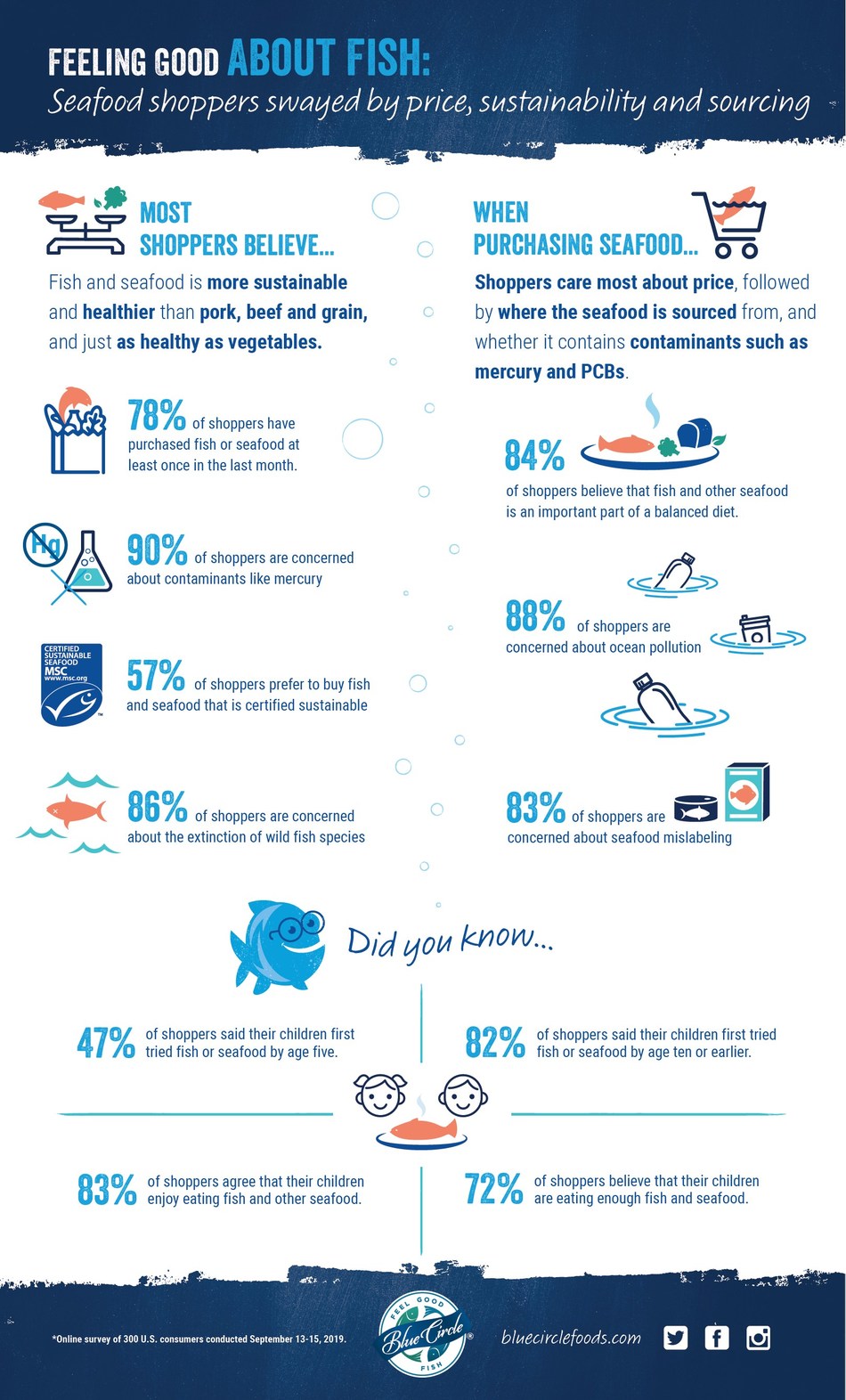
WASHINGTON — A new survey by leading sustainable seafood brand Blue Circle Foods revealed that although shoppers are concerned about where their fish comes from and what is in it, price still influences purchasing decisions. Data from the survey, conducted in the U.S. in Sept. 2019 by Blue Circle Foods, shows overwhelming concern about contaminants, ocean pollution and overfishing. Shoppers indicated a strong preference for fish and seafood that is certified sustainable; however, cost still topped consumers’ priorities. Blue Circle, which is committed to producing sustainable seafood with total transparency and traceability, initiated the survey to examine shoppers’ beliefs about seafood, and how this impacts their purchasing decisions.

To mark the start of National Seafood Month, Blue Circle Foods sought the opinions of over 300 consumers. 78 percent of the respondents had purchased fish or seafood at least once in the previous month, with most believing that fish and other seafood are more sustainable than land-based meats such as poultry, beef and pork. The survey showed that most shoppers think fish and seafood are healthier than pork, beef and grains, and just as healthy as vegetables, with 84 percent believing fish and other seafood to be an important part of a balanced diet.
What concerns shoppers most?
- 90 percent of shoppers are concerned about contaminants like mercury in fish and seafood
- 88 percent are concerned about ocean pollution
- 86 percent are worried about the extinction of wild fish species
- 83 percent are concerned about seafood mislabeling
Price dominated the list of ranked attributes that affect purchasing decisions, but shoppers clearly indicated that where seafood is sourced from, and whether it contains contaminants such as mercury and PCBs, are critical concerns. Interestingly, while they mirror concerns identified by the American Academy of Pediatrics (AAP) which suggest that fears over methylmercury pollution have led to a decline in U.S. families feeding fish to children, the survey revealed positive attitudes towards seafood:
- 47 percent of shoppers had offered their children seafood by age five
- 82 percent of children had eaten fish or seafood by age ten or earlier
- 83 percent of shoppers agreed that their children enjoyed eating fish and other seafood.
- 72 percent of shoppers believe that their children are eating enough fish and seafood.
The AAP recommends that children, pregnant and breastfeeding women eat 1-2 servings of fish per week, with sustainably caught or raised fish and shellfish offering the best choices.
“This survey confirms consumers’ chief concerns and provides us with a great opportunity, particularly during National Seafood Month, to help them make choices they can feel good about when buying fish,” says Nina Damato, supply chain manager at Blue Circle Foods. “Our ‘Feel Good Fish’ motto is to make sustainable seafood more accessible to all by ensuring 100 percent traceability, third party certification and peace of mind. We raise salmon using innovative practices that eschew antibiotics, growth hormones, GMOs and synthetic pigments while protecting wild fish stocks. The end result is certified sustainable salmon that is exceptionally high in omega-3s and free from contaminants,” she notes.
Aquaculture accounts for more than fifty percent of global seafood consumption, highlighting the need to produce fish more responsibly and efficiently, while preserving oceans and wild fish populations. Blue Circle Foods and its partner Kvarøy hope to inspire other producers to use responsible practices, which will in turn help to reduce the number of wild fish being caught for aquaculture feed.
Blue Circle Foods’ farmed Atlantic salmon is raised in pristine Arctic waters off the coast of central Norway and is sold fresh and frozen in the seafood counter at Whole Foods Market stores nationwide. The company’s smoked salmon is also sold at Whole Foods Market under the Changing Seas brand, and is available at www.bluecirclefoods.com/shop, on Amazon, and at select retailers under the Blue Circle Foods brand.
About Blue Circle Foods
Founded in 2005, Blue Circle Foods is at the forefront of a revolution in production, practice and taste in seafood. With deep roots in the organic industry, Blue Circle Foods brings its groundbreaking spirit to the oceans with a bold mission to change the way the world consumes seafood. Blue Circle sources, imports and distributes the most responsible farm-raised and wild-caught fish to ensure that both present and future consumers can enjoy high quality seafood. Blue Circle Foods is the parent company of the Changing Seas sustainable seafood brand, sold exclusively at Whole Foods Market. For more information on Blue Circle Foods and Changing Seas, visit www.bluecirclefoods.com.
*An online survey was conducted Sept. 13-15, 2019 with 313 primary decision makers and grocery shoppers



